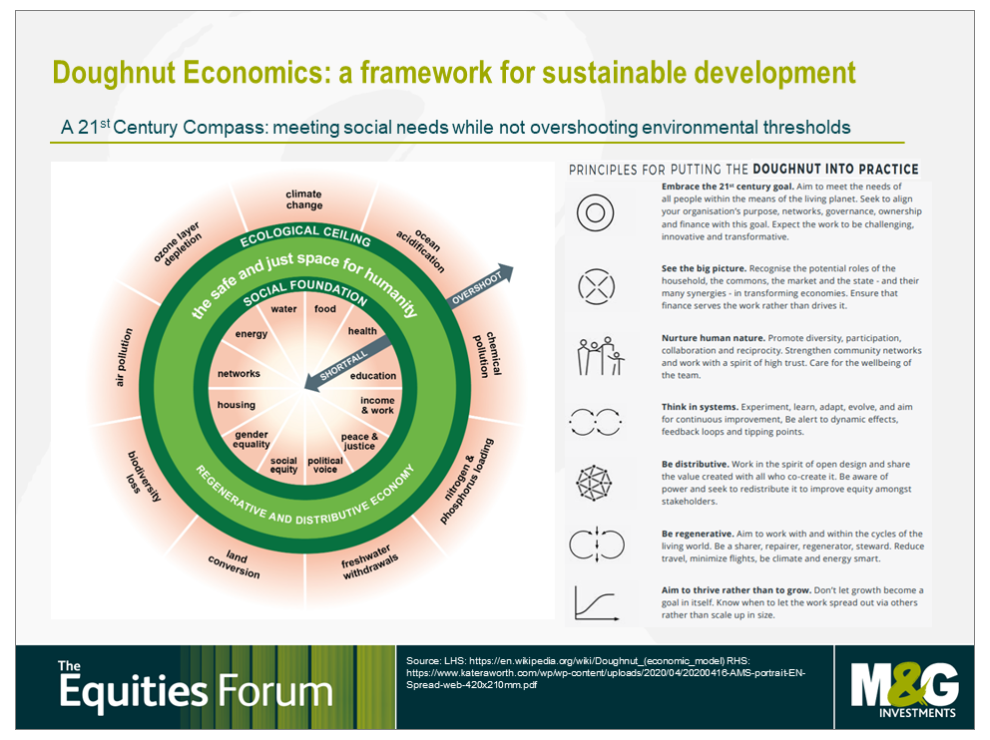
Reframing our understanding of ‘value’
As pioneering economist Mariana Mazzucato puts it, “the way the word ‘value’ is used in modern economics has made it easier for value-extracting activities to masquerade as value-creating activities”…”If the goal is to produce growth that is more innovation-led (smart growth), more inclusive and more sustainable, we need a better understanding of value to steer us.”[7]
Investors are recognising that we need to develop a clearer awareness of the different forms of capital – human, natural, civic and social, as well as financial and physical – to enable a more nuanced appreciation of the ‘value’ of things.
Investing for ‘Impact’
Investors have a major role to play by embracing the ‘power of purpose’ and allocating capital to sustainable companies that balance the needs of all stakeholders – directing capital away from ‘high societal cost’ companies to ‘high societal benefit’ companies. The EU sustainable taxonomy, though frustratingly and inevitably complex, will be crucial in helping to define the difference (first in an environmental context but, in due course, embracing social aspects too).
Going one step further, impact investing can lead the way in this shift and drive improvements in measurement and accounting for non-financial outcomes. The Impact Management Project (IMP) and its sister project the IMP+ACT Alliance are playing an invaluable enabling role in bringing together disparate approaches and methodologies into a simple-to-use framework for assessing and categorising how portfolios and underlying investments contribute to the solutions.
Impact investing is about more than just altruism. An ‘impact lens’ provides a crucial insight into more of the real risks faced by investors, in that it explicitly accounts for the risks (and opportunities) both ‘on and off’ corporate balance sheets; considering the costs created by companies which society currently has to bear. Fair responsibility for these costs, and more accurate accounting of them, will be crucial in addressing the true ‘value’ of companies.
Redesigning the future
It is rare to have the opportunity to redesign our future in the clear knowledge of what we need to address. We know that excessive waste is both economically inefficient and ecologically damaging; that pollution is harming human health, causing biodiversity loss and contributing to the climate crisis; and that inequality and injustice are not just concepts but real issues affecting hundreds of millions of people. So let’s design these unsustainable practices out of our system.
It makes sense to factor these very real costs into our analysis (and into the responsibilities of companies). Companies and investors who are ahead of the curve will benefit from the anticipated capital pricing shift, while also signalling to the rest of the market that this can be a successful model.
The world is going through a period of enormous disruption, but also one of enormous opportunity – neatly observed by the late Leonard Cohen in his epic song, Anthem, it’s through the “cracks” that “the light gets in”.
It is our responsibility to seize that opportunity and ‘recover’ more sustainably, build ‘resilience’ into the recovery, and ‘redesign’ the system for a future with sustainability and equality at its core.
[1] Source: https://coronavirus.jhu.edu/map.html
[2] Source: IMF, World Economic Outlook Update, June 2020
[3] Source: https://www.christianaid.org.uk/sites/default/files/2020-06/tipping-point-covid19-report-May2020.pdf
[5] Source: https://www.smithschool.ox.ac.uk/publications/wpapers/workingpaper20-02.pdf
[6] Source: https://upload.wikimedia.org/wikipedia/commons/1/12/Doughnut_%28economic_model%29.jpg
[7] Source: https://evonomics.com/value-of-everything-mariana-mazzucato/
The value of investments will fluctuate, which will cause prices to fall as well as rise and you may not get back the original amount you invested. Past performance is not a guide to future performance.









![[uns] house of commons, parliament](https://ifamagazine.com/wp-content/uploads/wordpress-popular-posts/788182-featured-300x200.webp)

